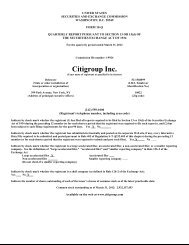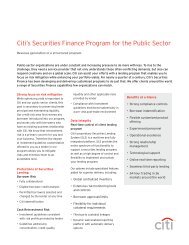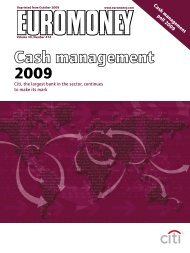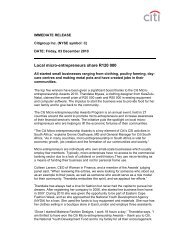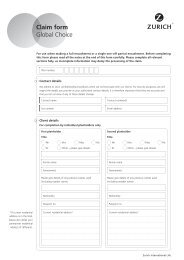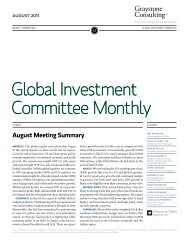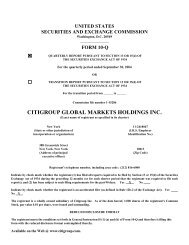for periodic stress tests (the first round of which is in the process of beingimplemented). The Federal Reserve Board may also impose other prudentialstandards, including contingent capital requirements, based upon itsauthority to distinguish among bank holding companies such as <strong>Citigroup</strong>in relation to their perceived riskiness, complexity, activities, size and otherfactors. The exact nature of these future requirements remains uncertain.Further, the so-called “Collins Amendment” reflected in the FinancialReform Act will result in new minimum capital requirements for bankholding companies such as <strong>Citigroup</strong>, and provides for the phase-out of trustpreferred securities and other hybrid capital securities from Tier 1 Capital forregulatory capital purposes, beginning January 1, 2013. As of December 31,2010, <strong>Citigroup</strong> had approximately $15.4 billion in outstanding trustpreferred securities that will be subject to the provisions of the CollinsAmendment. As a result, <strong>Citigroup</strong> may need to replace certain of its existingTier 1 Capital with new capital.Accordingly, <strong>Citigroup</strong> may not be able to maintain sufficient capitalin light of the changing and uncertain regulatory capital requirementsresulting from the Financial Reform Act, the Basel Committee, and U.S. orinternational regulators, or <strong>Citigroup</strong>’s costs to maintain such capital levelsmay increase.Changes in regulation of derivatives under the FinancialReform Act, including certain central clearing andexchange trading activities, will require <strong>Citigroup</strong> torestructure certain areas of its derivatives business whichwill be disruptive and may adversely affect the results ofoperations from certain of its over-the-counter and otherderivatives activities.The Financial Reform Act and the regulations to be promulgated thereunderwill require certain over-the-counter derivatives to be standardized, subjectto requirements for transaction reporting, clearing through regulatorilyrecognized clearing facilities and trading on exchanges or exchangelikefacilities. The regulations implementing this aspect of the FinancialReform Act, including for example the definition of, and requirementsfor, “swap execution facilities” through which transactions and reportingin standardized products may be required to be carried out, and thedetermination of margin requirements, are still in the process of beingformulated, and thus, the final scope of the requirements is not known. Theserequirements will, however, necessitate changes to certain areas of Citi’sderivatives business structures and practices, including without limitationthe successful and timely installation of the appropriate technological andoperational systems to report and trade the applicable derivatives accurately,which will be disruptive, divert management attention and require additionalinvestment into such businesses.The above changes could also increase <strong>Citigroup</strong>’s exposure to theregulatorily recognized clearing facilities and exchanges, which could buildup into material concentrations of exposure. This could result in <strong>Citigroup</strong>having a significant dependence on the continuing efficient and effectivefunctioning of these clearing and trading facilities, and on their continuingfinancial stability.In addition, under the so-called “push-out” provisions of the FinancialReform Act and the regulations to be promulgated thereunder, derivativesactivities, with the exception of bona fide hedging activities and derivativesrelated to traditional bank-permissible reference assets, will be curtailedon FDIC-insured depository institutions. <strong>Citigroup</strong>, like many of its U.S.bank competitors, conducts a substantial portion of its derivatives activitiesthrough an insured depository institution. Moreover, to the extent thatcertain of Citi’s competitors conduct such activities outside of FDIC-insureddepository institutions, Citi would be disproportionately impacted by anyrestructuring of its business for push-out purposes. While the exact natureof the changes required under the Financial Reform Act is uncertain, thechanges that are ultimately implemented will require restructuring theseactivities which could negatively impact Citi’s results of operations fromthese activities.Regulatory requirements aimed at facilitating thefuture orderly resolution of large financial institutionscould result in <strong>Citigroup</strong> having to change its businessstructures, activities and practices in ways that negativelyimpact its operations.The Financial Reform Act requires Citi to plan for a rapid and orderlyresolution in the event of future material financial distress or failure,and to provide its regulators information regarding the manner in whichCitibank, N.A. and its other insured depository institutions are adequatelyprotected from the risk of non-bank affiliates. Regulatory requirementsaimed at facilitating future resolutions in the U.S. and globally couldresult in <strong>Citigroup</strong> having to restructure or reorganize businesses, legalentities, or intercompany systems or transactions in ways that negativelyimpact <strong>Citigroup</strong>’s operations. For example, Citi could be required to createnew subsidiaries instead of branches in foreign jurisdictions, or createseparate subsidiaries to house particular businesses or operations (so-called“subsidiarization”), which would, among other things, increase Citi’s legal,regulatory and managerial costs, negatively impact Citi’s global capital andliquidity management and potentially impede its global strategy.While <strong>Citigroup</strong> believes one of its competitive advantagesis its extensive global network, Citi’s extensive operationsoutside of the U.S. subject it to emerging market andsovereign volatility and numerous inconsistent orconflicting regulations, which increase Citi’s compliance,regulatory and other costs.<strong>Citigroup</strong> believes its extensive global network—which includes a physicalpresence in approximately 100 countries and services offered in over160 countries and jurisdictions—provides it a competitive advantage inservicing the broad financial services needs of large multinational clients andits customers around the world, including in many of the world’s emergingmarkets. This global footprint, however, subjects Citi to emerging market andsovereign volatility and extensive, often inconsistent or conflicting, regulation,all of which increase Citi’s compliance, regulatory and other costs.72
The emerging markets in which Citi operates or invests are often morevolatile than the U.S. markets or other developed markets, and are subjectto changing political, social, economic and financial factors, includingcurrency exchange laws or other laws or restrictions applicable to companiesor investments in those markets or countries. Citi’s extensive globaloperations also expose it to sovereign risk, particularly in the countries inwhich Citi has a physical presence. There have recently been instances ofdisruptions and internal strife in some countries in which <strong>Citigroup</strong> operateswhich can place Citi’s staff at risk and can result in losses, particularlyif the sovereign defaults or nationalizes Citi’s assets. These risks must bebalanced against <strong>Citigroup</strong>’s obligations to its customers in the countryand its obligations to the central bank as a major international participantin the functioning of the country’s wholesale market. In addition, Citi’sglobal footprint also subjects it to higher compliance risk relating toU.S. regulations primarily focused on various aspects of global corporateactivities, such as anti-money laundering and Foreign Corrupt PracticesAct violations, which can also be more acute in less developed markets andwhich can require substantial investments in order to comply.<strong>Citigroup</strong> believes the level of regulation of financial institutions aroundthe world will likely further increase as a result of the recent financial crisisand the numerous regulatory efforts underway outside the U.S., which,to date, have not necessarily been undertaken on a coordinated basis. Forexample, uncertainties in the global regulatory arena that could impact<strong>Citigroup</strong> include, among others, different and inconsistent insolvency andresolution regimes and capital and liquidity requirements that may result inmandatory “ring-fencing” of capital or liquidity in certain jurisdictions, thusincreasing <strong>Citigroup</strong>’s overall global capital and liquidity needs, as well asthe possibility of bank taxes or fees, some of which could be significant.The extensive regulations to which Citi is subject, or may be subject in thefuture, are often inconsistent or conflicting, not only with U.S. regulations,but among jurisdictions around the world. Moreover, depending on the finalregulations, Citi could be disproportionately impacted in comparison to otherglobal financial institutions. Any failure by Citi to remain in compliance withapplicable U.S. regulations as well as the regulations in the countries andmarkets in which it operates as a result of its global footprint could resultin fines, penalties, injunctions or other similar restrictions, any of whichcould negatively impact Citi’s earnings as well as its reputation generally. Inaddition, complying with inconsistent, conflicting or duplicative regulationsrequires extensive time and effort and further increases <strong>Citigroup</strong>’scompliance, regulatory and other costs.Provisions of the Financial Reform Act and otherregulations relating to securitizations will imposeadditional costs on securitization transactions, increase<strong>Citigroup</strong>’s potential liability in respect of securitizationsand may prohibit <strong>Citigroup</strong> from performing certain rolesin securitizations, each of which could make it impracticalto execute certain types of transactions and may have anoverall negative effect on the recovery of the securitizationmarkets.<strong>Citigroup</strong> plays a variety of roles in asset securitization transactions,including acting as underwriter of asset-backed securities, depositor ofthe underlying assets into securitization vehicles and counterparty tosecuritization vehicles under derivative contracts. The Financial ReformAct contains a number of provisions intended to increase the regulationof securitizations. These include a requirement that securitizers retainun-hedged exposure to at least 5% of the economic risk of certain assetsthey securitize, a prohibition on securitization participants engaging intransactions that would involve a conflict with investors in the securitizationand extensive additional requirements for review and disclosure of thecharacteristics of the assets underlying securitizations. In addition, theFDIC has adopted new criteria for establishing transfers of assets intosecuritization transactions from entities subject to its resolution authority,and the FASB has modified the requirements for transfers of assets tobe recognized for financial accounting purposes and for securitizationvehicles to be consolidated with a securitization participant. In April 2010,the SEC proposed further additional, extensive regulation of securitizationtransactions.The cumulative effect of these extensive regulatory changes, as well asother potential future regulatory changes (e.g., GSE reform), on the natureand profitability of securitization transactions, and Citi’s participationtherein, cannot currently be assessed. It is likely, however, that these variousmeasures will increase the costs of executing securitization transactions,could effectively limit Citi’s overall volume of, and the role Citi may playin, securitizations, expose <strong>Citigroup</strong> to additional potential liability forsecuritization transactions and make it impractical for <strong>Citigroup</strong> to executecertain types of securitization transactions it previously executed. In addition,certain sectors of the overall securitization markets, such as residentialmortgage-backed securitizations, have been inactive or experienceddramatically diminished transaction volumes for the last several years dueto the financial crisis. The recovery of the overall securitization markets,and thus the opportunities for <strong>Citigroup</strong> to participate in securitizationtransactions, could also be adversely affected by these various regulatoryreform measures.73
- Page 1 and 2: UNITED STATESSECURITIES AND EXCHANG
- Page 3 and 4: CITIGROUP’S 2010 ANNUAL REPORT ON
- Page 5 and 6: As described above, Citigroup is ma
- Page 7 and 8: Operating ExpensesCitigroup operati
- Page 9 and 10: FIVE-YEAR SUMMARY OF SELECTED FINAN
- Page 11 and 12: CITIGROUP REVENUESIn millions of do
- Page 13 and 14: REGIONAL CONSUMER BANKINGRegional C
- Page 15 and 16: 2009 vs. 2008Revenues, net of inter
- Page 17 and 18: 2009 vs. 2008Revenues, net of inter
- Page 19 and 20: 2009 vs. 2008Revenues, net of inter
- Page 21 and 22: 2009 vs. 2008Revenues, net of inter
- Page 23 and 24: SECURITIES AND BANKINGSecurities an
- Page 25 and 26: TRANSACTION SERVICESTransaction Ser
- Page 27 and 28: BROKERAGE AND ASSET MANAGEMENTBroke
- Page 29 and 30: Japan Consumer FinanceCitigroup con
- Page 31 and 32: The following table provides detail
- Page 33 and 34: CORPORATE/OTHERCorporate/Other incl
- Page 35 and 36: During 2010, average Consumer loans
- Page 37 and 38: SEGMENT BALANCE SHEET AT DECEMBER 3
- Page 39 and 40: Citigroup Regulatory Capital Ratios
- Page 41 and 42: Capital Resources of Citigroup’s
- Page 43 and 44: Regulatory Capital Standards Develo
- Page 45 and 46: DepositsCiti continues to focus on
- Page 47 and 48: Secured financing is primarily cond
- Page 49 and 50: Each of the credit rating agencies
- Page 51: RISK FACTORSThe ongoing implementat
- Page 55 and 56: is largely uncertain. However, any
- Page 57 and 58: a short-term Liquidity Coverage Rat
- Page 59 and 60: understanding or cause confusion ac
- Page 61 and 62: MANAGING GLOBAL RISKRISK MANAGEMENT
- Page 63 and 64: CREDIT RISKCredit risk is the poten
- Page 65 and 66: [This page intentionally left blank
- Page 67 and 68: (1) 2010 primarily includes an addi
- Page 69 and 70: Non-Accrual Loans and AssetsThe tab
- Page 71 and 72: Renegotiated LoansThe following tab
- Page 73 and 74: Citi’s first mortgage portfolio i
- Page 75 and 76: Consumer Mortgage FICO and LTVData
- Page 77 and 78: Second Mortgages: December 31, 2010
- Page 79 and 80: Interest Rate Risk Associated with
- Page 81 and 82: North America Cards—FICO Informat
- Page 83 and 84: CONSUMER LOAN DETAILSConsumer Loan
- Page 85 and 86: Consumer Loan Modification Programs
- Page 87 and 88: North America CardsNorth America ca
- Page 89 and 90: Payment deferrals that do not conti
- Page 91 and 92: Repurchase ReserveCiti has recorded
- Page 93 and 94: Securities and Banking-Sponsored Pr
- Page 95 and 96: The following table presents the co
- Page 97 and 98: MARKET RISKMarket risk encompasses
- Page 99 and 100: Trading PortfoliosPrice risk in tra
- Page 101 and 102: INTEREST REVENUE/EXPENSE AND YIELDS
- Page 103 and 104:
AVERAGE BALANCES AND INTEREST RATES
- Page 105 and 106:
ANALYSIS OF CHANGES IN INTEREST EXP
- Page 107 and 108:
[This page intentionally left blank
- Page 109 and 110:
As required by SEC rules, the table
- Page 111 and 112:
The credit valuation adjustment amo
- Page 113 and 114:
The fair values shown are prior to
- Page 115 and 116:
Key Controls over Fair Value Measur
- Page 117 and 118:
The following table reflects the in
- Page 119 and 120:
The results of the July 1, 2010 tes
- Page 121 and 122:
As a result of the losses incurred
- Page 123 and 124:
MANAGEMENT’S ANNUAL REPORT ON INT
- Page 125 and 126:
• an “ownership change” under
- Page 127 and 128:
REPORT OF INDEPENDENT REGISTERED PU
- Page 129 and 130:
FINANCIAL STATEMENTS AND NOTES TABL
- Page 131 and 132:
CONSOLIDATED FINANCIAL STATEMENTSCO
- Page 133 and 134:
CONSOLIDATED BALANCE SHEET(Continue
- Page 135 and 136:
CONSOLIDATED STATEMENT OF CHANGES I
- Page 137 and 138:
CITIBANK CONSOLIDATED BALANCE SHEET
- Page 139 and 140:
NOTES TO CONSOLIDATED FINANCIAL STA
- Page 141 and 142:
Repurchase and Resale AgreementsSec
- Page 143 and 144:
ecoveries are added. Securities rec
- Page 145 and 146:
Consumer Mortgage Representations a
- Page 147 and 148:
Transfers of Financial AssetsFor a
- Page 149 and 150:
ACCOUNTING CHANGESChange in Account
- Page 151 and 152:
The following table reflects the in
- Page 153 and 154:
Measuring Liabilities at Fair Value
- Page 155 and 156:
Revisions to the Earnings-per-Share
- Page 157 and 158:
FUTURE APPLICATION OF ACCOUNTING ST
- Page 159 and 160:
3. DISCONTINUED OPERATIONSSale of T
- Page 161 and 162:
CitiCapitalOn July 31, 2008, Citigr
- Page 163 and 164:
5. INTEREST REVENUE AND EXPENSEFor
- Page 165 and 166:
Stock Award ProgramsCitigroup issue
- Page 167 and 168:
In January 2009, members of the Man
- Page 169 and 170:
Information with respect to stock o
- Page 171 and 172:
9. RETIREMENT BENEFITSThe Company h
- Page 173 and 174:
The following table shows the chang
- Page 175 and 176:
A one-percentage-point change in th
- Page 177 and 178:
Level 3 Roll ForwardThe reconciliat
- Page 179 and 180:
10. INCOME TAXESIn millions of doll
- Page 181 and 182:
The Company is currently under audi
- Page 183 and 184:
11. EARNINGS PER SHAREThe following
- Page 185 and 186:
13. BROKERAGE RECEIVABLES AND BROKE
- Page 187 and 188:
The table below shows the fair valu
- Page 189 and 190:
Debt Securities Held-to-MaturityThe
- Page 191 and 192:
Evaluating Investments for Other-Th
- Page 193 and 194:
The following is a 12-month roll-fo
- Page 195 and 196:
16. LOANSCitigroup loans are report
- Page 197 and 198:
Residential Mortgage Loan to Values
- Page 199 and 200:
The following table presents Corpor
- Page 201 and 202:
Included in the Corporate and Consu
- Page 203 and 204:
18. GOODWILL AND INTANGIBLE ASSETSG
- Page 205 and 206:
Intangible AssetsThe components of
- Page 207 and 208:
CGMHI has committed long-term finan
- Page 209 and 210:
20. Regulatory CapitalCitigroup is
- Page 211 and 212:
22. SECURITIZATIONS AND VARIABLE IN
- Page 213 and 214:
In millions of dollars As of Decemb
- Page 215 and 216:
Funding Commitments for Significant
- Page 217 and 218:
Credit Card SecuritizationsThe Comp
- Page 219 and 220:
Managed Loans—Citi HoldingsThe fo
- Page 221 and 222:
Key assumptions used in measuring t
- Page 223 and 224:
Mortgage Servicing RightsIn connect
- Page 225 and 226:
The Company administers one conduit
- Page 227 and 228:
Key Assumptions and Retained Intere
- Page 229 and 230:
Municipal InvestmentsMunicipal inve
- Page 231 and 232:
Derivative NotionalsIn millions of
- Page 233 and 234:
activities together with gains and
- Page 235 and 236:
Cash Flow HedgesHedging of benchmar
- Page 237 and 238:
The range of credit derivatives sol
- Page 239 and 240:
24. CONCENTRATIONS OF CREDIT RISKCo
- Page 241 and 242:
Trading account assets and liabilit
- Page 243 and 244:
The internal valuation techniques u
- Page 245 and 246:
In millions of dollars at December
- Page 247 and 248:
Changes in Level 3 Fair Value Categ
- Page 249 and 250:
In millions of dollarsDecember 31,2
- Page 251 and 252:
26. FAIR VALUE ELECTIONSThe Company
- Page 253 and 254:
The following table provides inform
- Page 255 and 256:
Certain structured liabilitiesThe C
- Page 257 and 258:
28. PLEDGED SECURITIES, COLLATERAL,
- Page 259 and 260:
The repurchase reserve estimation p
- Page 261 and 262:
CollateralCash collateral available
- Page 263 and 264:
29. CONTINGENCIESOverviewIn additio
- Page 265 and 266:
pursuant to which Citigroup agreed
- Page 267 and 268:
court filings under docket number 0
- Page 269 and 270:
30. CITIBANK, N.A. STOCKHOLDER’S
- Page 271 and 272:
Condensed Consolidating Statements
- Page 273 and 274:
Condensed Consolidating Statements
- Page 275 and 276:
Condensed Consolidating Balance She
- Page 277 and 278:
Condensed Consolidating Statements
- Page 279 and 280:
33. SELECTED QUARTERLY FINANCIAL DA
- Page 281 and 282:
SUPERVISION AND REGULATIONCitigroup
- Page 283 and 284:
Citigroup continues to evaluate its
- Page 285 and 286:
CORPORATE INFORMATIONCITIGROUP EXEC
- Page 287 and 288:
SignaturesPursuant to the requireme



